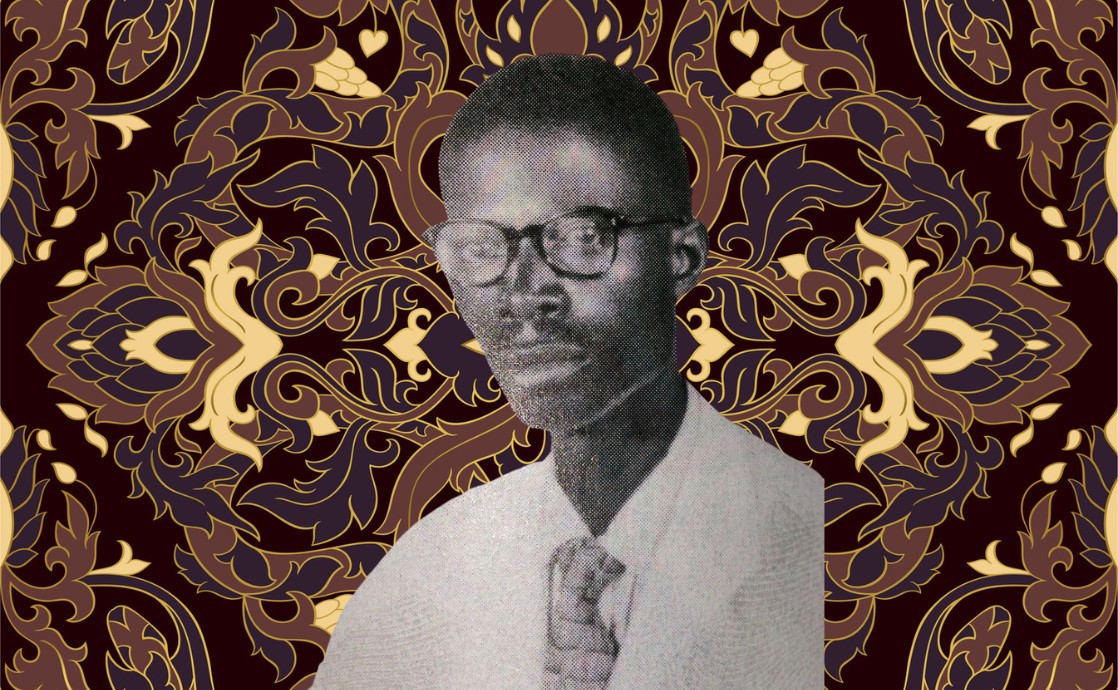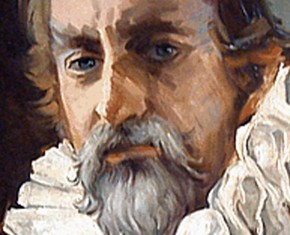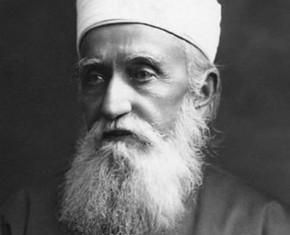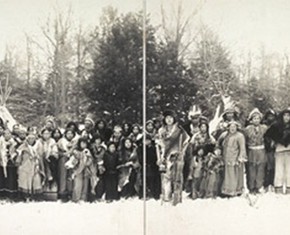The views expressed in our content reflect individual perspectives and do not represent the authoritative views of the Baha'i Faith.
What cause would you give your life for? When we think about early African Baha’is who died as a result of their beliefs, the names of Enoch Olinga (Uganda, 1979) and Duarte Vieira (Guinea-Bissau, 1966) come to our minds.
But there were other Baha’i martyrs in Africa — one of them was Joaquim Sampaio. Mr. Sampaio was born in Angola, near the city of Malanje, in 1922. In those days, Angola was an impoverished Portuguese colony, and it was forced to grow cotton as a commodity crop for Portugal.

From his early youth, Joaquim developed a deep interest in spiritual and religious subjects. He read and studied the Bible, and eventually, he claimed to have a spiritual gift, announcing that a great message from God was coming, which would unite all peoples. He also said that this message had not yet reached Malanje, but that he would recognize it when it appeared. By then, his radiant spirituality had made him known in the Malanje area as the “Revealed One.”
RELATED: Dr. George Washington Carver: Inventor and Baha’i Advocate
In 1956, he received a letter from his uncle Francisco Ebo in Luanda, who told him that a new divine message had indeed appeared. Joaquim was very curious and answered his uncle with three straight questions: Where was the center of this new Faith? What nationality is this messenger? What is his mission?
The answer from Mr. Ebo came a few weeks later: The center of the new Faith is in the Holy Land, in Haifa; the messenger, Baha’u’llah, came from the East, from Persia; his message is to unite all humanity. Having read this answer, Joaquim Sampaio said to his family and friends: “This is the Faith I have been waiting for!”
After a few weeks, Mr. Sampaio traveled to Luanda to meet his uncle Francisco and other Baha’is. They had long, deep, and significant conversations. The Baha’is of Luanda were impressed with Mr. Sampaio’s discourse, his conviction, and his enthusiasm. Back in Malanje, Mr. Sampaio claimed openly to be a Baha’i, stirring family and friends with the news of the new revelation. In the following weeks, they received a visit from the Baha’is of Luanda, several persons from the Malanje area accepted the Faith, and, in 1957, the first Spiritual Assembly of the Baha’is of Malanje was elected.
Joaquim Sampaio was married and had five children. His life wasn’t easy. He worked as a foreman for Cotonang, a cotton plantation company. He earned 350 escudos a month when, at that time, a good pair of shoes cost 250 escudos. When John Robarts visited Angola in 1959 and met Mr. Sampaio in Luanda, he described him with these words: “Sampaio is thin, undernourished. I suspect he is at a starvation level and eating almost nothing so that his family can have more.”

In his spare time, Joaquim would ride his bicycle to go to various villages near Malanje to carry the Baha’i message to others. Mrs. Hilda Xavier Rodrigues, a Baha’i living in Luanda, described him this way: “He is the type who would love to go out and pioneer all over the country, such a spirit he has. I love the way he feels the [Baha’i] Cause and tells his friends to unite and be prudent, be silent, be observant.”
During his travels to Malanje’s neighboring villages, Mr. Sampaio no doubt witnessed the terrible conditions in which rural populations lived, forced to cultivate and produce large quantities of cotton, and often prevented from maintaining their traditional agricultural crops, which meant many went hungry.
Mr. Sampaio’s enthusiasm for the revelation of Baha’u’llah and for teaching the Baha’i Faith led, in 1957, several students from the Evangelical school in Quizanga to abandon the church and accept the Baha’i Faith. Joaquim’s activities as Baha’i became more and more visible. It didn’t take long for the colonial authorities to raise eyebrows at the man who they called “that propagandist of the Baha’i Faith.” Family and friends warned Joaquim to be careful and keep a low profile. After all, this new religion was not known to the authorities, and his teaching it to others could bring him bad consequences. But Joaquim ignored the warnings.
RELATED: W.E.B. and Nina Du Bois: Lovers of the Baha’i Principles
The police of Malanje detained Mr. Sampaio on several occasions due to his Baha’i activities. In one of the statements recorded at the police station, Mr. Sampaio is described as “the main preacher of the Baha’i Faith in Malanje,” even though Baha’is have no clergy. The statement includes Joaquim’s narrative of his discovering the Baha’i Faith and his mystical dreams. As he told the police:
… he read Baha’i books and liked them a lot because they were not against his religion, nor against the government, there only one God and the Bible seems to be one of his bases. When he began to have doubts, he began recording them in a notebook. At night he began to have visions in which a figure he could not recognize appeared to him, and clarified his doubts about several passages of the Bible that until then were incomprehensible to him. He told these visions to several friends, and these friends later asked him to learn more about the new religion.

In early January 1960, Mr. Sampaio wrote a letter to a Baha’i committee. His words were almost a premonition:
The people of Angola are afraid because they are slaves of another race and have always been dominated. We are told that if we accept the [Baha’i] Faith we will probably be arrested. It is a shame that this spirit of fear dominates the people of Angola, because if God freed them from their cage, they would still be afraid to fly. Only the revealed ones are not afraid because they are servants of Baha’u’llah. This is not due to a lack of willingness to convey the Glad Tidings, but because people are afraid unless the enemies of the Faith stop harassing them. But the people testify that this, in fact, is the Promised One that the people are waiting for. Let’s see if in 1960, Angola will become freer.
However, during that time, Angola became less and less free, and the activities of the Baha’is were being monitored by PIDE, the national political police. In June 1960, a document from PIDE stated that the Baha’i Faith could be a source of political unrest masquerading as a religion, and the Baha’is “are being used for the de-nationalization movement” with its “principles and teachings of development, peace and equal rights.” These allegations were not true, but in late 1960, a general strike broke out among the cotton farmers around Malanje. It was violently repressed throughout the province. In February of 1961, Angola’s War of Liberation began, and unprecedented violence and repression spread across the entire country. Any African considered suspicious by the colonial authorities would be arrested, detained, and imprisoned, his fate unknown.
Soon, PIDE began to arrest prominent Baha’is in Malanje and Luanda. They were all sent to a prison camp at Baia dos Tigres in southern Angola. In the middle of the night, the PIDE detained Mr. Sampaio at his home, and he was never seen again.
Angolan Baha’is understand that Joaquim Sampaio died in prison because of his firm belief in the Baha’i Faith. Most likely, he was the first Angolan Baha’i martyr. Abdu’l-Baha, in a speech he gave in North America in 1912, praised such martyrs and spelled out the reasons a person would give his life for his beliefs:
Through the teachings of Baha’u’llah the horizon of the East was made radiant and glorious. Souls who have hearkened to His words and accepted His message live together today in complete fellowship and love. They even offer their lives for each other. They forego and renounce worldly possessions for one another, each preferring the other to himself. This has been due to the declaration and foundation of the oneness of the world of humanity. Today in Persia there are meetings and assemblages wherein souls who have become illumined by the teachings of Baha’u’llah — representative Muslims, Christians, Jews, Zoroastrians, Buddhists and of the various denominations of each — mingle and conjoin in perfect fellowship and absolute agreement. A wonderful brotherhood and love is established among them, and all are united in spirit and service for international peace. More than twenty thousand Baha’is have given their lives in martyrdom for the Cause of God. The governments of the East arose against them, bent upon their extermination. They were killed relentlessly, but day by day their numbers have increased, day by day they have multiplied in strength and become more eloquent. They have been strengthened through the efficacy of a wonderful spiritual power.
RELATED: Artist Masud Olufani Honors the First African American Baha’i
Historian Moojan Momen recalls that the political unrest that plagued several African countries eager for independence “had a great impact on a growing Baha’i community.” Regarding the Baha’is of Angola, he adds:
The Roman Catholic clergy decided to take advantage of the fears of the Portuguese authorities and accused the Baha’is of being terrorists. Many believers were detained and interrogated. Among the main victims was Joaquim Sampaio. He was taken away in the middle of the night and they never saw him again. It is believed that he was executed or died in a prison camp …
Many, many people have given their lives for their firm belief in the Baha’i teachings of peace, love, and unity. Their courageous acceptance of those spiritual teachings transcended even the fear of death.
You May Also Like
Comments

















There is a book called “Heroes and Heroines of the Ten Year Crusade in Southern Africa” (by Lowell Johnson e Edith Johnson), that mentions many of the early Baha'is in Angola and Mozambique. This book has short biographies of those Baha'is from Malanje and Luanda in the 1950s and 1960s. Several were arrested by PIDE and sent to the prison camp at Baia dos Tigres.
The interesting point for me was to find copies of PIDE’s archives (at the Baha’i Center in Lisbon) with statements and documents from Mr. Sampaio and other Baha’is.
Unfortunately, I have not ...found any official document mentioning Mr. Sampaio’s death. I presume his death wasn’t registered, like many other Angolans who died at the hands of PIDE in those days.